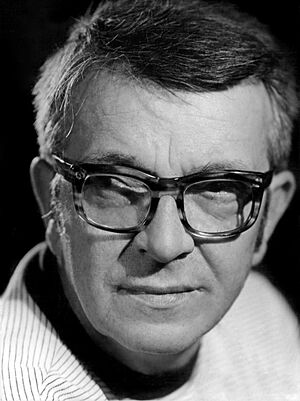Zoltán Fábri facts for kids
Quick facts for kids
Zoltán Fábri
|
|
|---|---|
 |
|
| Born | 15 October 1917 |
| Died | 23 August 1994 (aged 76) |
| Occupation | Film director |
| Years active | 1951–1983 |
Zoltán Fábri (born October 15, 1917 – died August 23, 1994) was a famous Hungarian film director and screenwriter. He was known for making movies that explored important questions about being human.
Two of his films, The Boys of Paul Street (1969) and Hungarians (1978), were even nominated for an Academy Award for Best Foreign Language Film. This is a very big honor in the film world! His 1965 film Twenty Hours won a top prize at the 4th Moscow International Film Festival. He also won a special award for directing at the 9th Moscow International Film Festival for his 1975 film 141 Minutes from the Unfinished Sentence.
Contents
Zoltán Fábri's Life and Work
Zoltán Fábri loved art from a young age. He studied painting and graduated from the Hungarian College of Fine Arts. In 1950, he started working in the Hungarian film industry. He began as a production designer, which means he helped create the look and feel of the movie sets.
Becoming a Director
Fábri directed his first film, Vihar (Storm), in 1951. He became famous around the world with his third movie, Körhinta (Merry Go-Round), in 1956. He continued to direct and write films until the early 1980s.
After he stopped making films, Fábri taught at the University of Theatre and Film Arts in Budapest. He also wrote screenplays in his later years, but these were never made into movies. From 1959 to 1981, Fábri was the president of the Hungarian Film Artist Union, which is like a club for people who make films in Hungary.
His Unique Filmmaking Style
Fábri's movies are often described as "classical." This means he used traditional and well-known techniques in his art. He was inspired by film styles like Italian Neorealism and French Poetic Realism. These styles focused on showing real life and everyday people.
In the 1960s, he tried out different ways of telling stories, like using flashbacks. His 1976 film Az ötödik pecsét even had some very dream-like or surrealist scenes. However, he generally stuck to his classical style and didn't use many of the newer, more experimental film techniques of his time. This made his films popular with the government at the time.
In 1979, he received an Honorable Prize at the 11th Moscow International Film Festival for his important contributions to cinema.
A Perfectionist Director
Zoltán Fábri was known for being a perfectionist. He planned every single scene in his movies down to the smallest detail, months before filming even began. He would write, draw, and even choreograph (plan the movements) everything precisely. He rarely changed things on the spot.
Even though he had a reputation for being strict, he was very kind and friendly to the child actors on the set of The Boys of Paul Street.
Most of Fábri's films were based on books or short stories, and he wrote the screenplays himself. A common theme in his movies was the question of what it means to be human. Many of his films were set during or around World War II. He often worked with actress Mari Törőcsik and cinematographer György Illés. In 1969, he even acted in one film, A tanú (The Witness), which was a comedy made by his friend Péter Bacsó.
Zoltán Fábri passed away in 1994 from a heart attack when he was 76 years old.
Zoltán Fábri's Films
Here is a list of some of the films Zoltán Fábri worked on:
| Title | Year | International Title | Director | Screenwriter | Production Designer | Actor |
|---|---|---|---|---|---|---|
| Maddie the Goose-boy | 1950 | |||||
| Déryné | 1951 | |||||
| Vihar | 1952 | Storm | ||||
| Erkel | 1952 | |||||
| Életjel | 1954 | Fourteen Lives | ||||
| Dandin György, avagy a megcsúfolt férj | 1955 | |||||
| Körhinta | 1956 | Merry Go-Round | ||||
| Hannibál tanár úr | 1956 | Professor Hannibal | ||||
| Bolond április | 1957 | Summer Clouds | ||||
| Édes Anna | 1958 | Sweet Anna | ||||
| Dúvad | 1961 | Brute | ||||
| Két félidő a pokolban | 1962 | The Last Goal | ||||
| Nappali sötétség | 1963 | Darkness in Daytime | ||||
| Vízivárosi nyár | 1964 | Hard Summer (TV series) | ||||
| Húsz óra | 1965 | Twenty Hours | ||||
| Útószezon | 1966 | Late Season | ||||
| A Pál-utcai fiúk | 1969 | The Boys of Paul Street | ||||
| Isten hozta, őrnagy úr! | 1969 | The Tóth Family | ||||
| A tanú | 1969 | The Witness | ||||
| Hangyayaboly | 1971 | Ant Hill | ||||
| Plusz-mínusz egy nap | 1973 | Plus-Minus One Day | ||||
| 141 perc a befejezetlen mondatból | 1975 | 141 Minutes from the Unfinished Sentence | ||||
| Az ötödik pecsét | 1976 | The Fifth Seal | ||||
| Magyarok | 1978 | Hungarians | ||||
| Fábián Bálint találkozása Istennel | 1980 | Bálint Fábian Meets God | ||||
| Requiem | 1981 | |||||
| Gyertek el a névnapomra | 1983 | Housewarming |
 | Kyle Baker |
 | Joseph Yoakum |
 | Laura Wheeler Waring |
 | Henry Ossawa Tanner |

